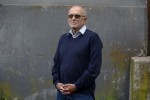One of the less commented-on aspects of the Russo-Ukrainian war is that the conflict also serves as a proxy struggle between the two Koreas.
North Korea’s military aid to Russia has been widely publicized, with the shipment of artillery shells and short-range ballistic missiles to Moscow. Less well known is Seoul’s aid to Ukraine, which has taken the form of delivering 155-millimeter artillery shells to Poland which then passes them on to Ukraine. This transaction is meant to avoid its self-imposed ban on supplying weapons to combatants in a foreign war.
More importantly, the Russo-Ukrainian war has served as a catalyst in solidifying the links of the two Koreas with emerging rival superblocs. North Korea is cementing its ties within what might be called the Eurasia bloc, which also includes China, Russia and Iran.
Meanwhile, South Korea has strengthened its relations with the U.S. and its allies, including the NATO countries and Japan. After the Russian invasion of Ukraine in 2022, President Yoon Suk Yeol became the first Korean president to attend a NATO summit. Seoul and NATO have also launched a new partnership program to strengthen cooperation in areas such as arms control, counterterrorism and cyber defense.
Although the Russo-Ukraine war has little direct bearing on Korea’s national security, Yoon’s outreach to NATO reflects his goal of making Korea into a “global pivotal state” that would boost its influence in shaping the international order.
North Korea so far seems to be reaping most of the benefits from its involvement in the Ukraine conflict. Moscow is already proving that it is willing to use diplomatic heft to watch Pyongyang’s back. It recently vetoed the annual renewal of the U.N. Panel of Experts that monitors the international sanctions regime against North Korea for its nuclear and missile programs. This would make it easier for Pyongyang to avoid the impact of sanctions.
There are reports that Russia is aiding North Korea in the areas of satellite and missile technology in return for Pyongyang’s arms supplies.
Russia is seen as encouraging closer ties between energy-starved North Korea and oil-rich Iran, which is also supplying weapons to Moscow.
The Kremlin recently said it intended to develop ties with Pyongyang in “all possible areas” amid reports that it was shipping refined petroleum to North Korea in excess of limits imposed by the UN sanctions. There are suggestions that Russian President Vladimir Putin will visit Pyongyang by the end of 2024.
The situation for South Korea in relation to the Ukraine conflict is more ambiguous. On the one hand, Seoul’s role as an arms supplier to NATO and Ukraine highlights its ambition to become a leader in the global defense industry. One reason why South Korea has been able to supply artillery shells to Ukraine is that it operates the largest force of self-propelled 155-millimeter artillery guns in the world.
But supplying Ukraine with weapons also marks a departure from Seoul’s traditional foreign policy of not becoming embroiled in conflicts that do not affect the country directly, while trying to conserve arms stockpiles to counter a potential North Korean invasion.
The Ukraine conflict represents a potential drain on Korea’s military resources if it continues for a long time. The war has settled into a stalemate and Putin appears ready to commit to a long-term strategy of gradually nibbling away at Ukraine piece by piece, knowing that Russia enjoys an advantage in terms of manpower. Seoul may eventually decide that supplying arms to Ukraine is not worth the price in a war of attrition, if not a losing one.
Meanwhile, Moscow has warned that any supply of weapons by Seoul to Kviv would be considered “an act of anti-Russian hostility.” Yoon has said he wants to maintain amicable relations with Russia in the hope that it would try to moderate North Korea’s actions. But that is unlikely if South Korea continues to send arms to Ukraine.
The issue of arms shipments to Ukraine raises questions about Seoul’s ability to undertake active engagement and intervention in other controversial international disputes from Taiwan to the Middle East as suggested by Yoon’s “global pivotal state” policy.
As a prosperous liberal democracy, Yoon may believe that Korea should play a role in countering Russia’s violation of what it regards as the rules-based international order. But he must also take into account that any foreign policy should also reflect the national interest. Military support for Ukraine may fall short of that goal.
John Merrill (jmerrill05@gmail.com) is a visiting scholar at the Institute of Korean Studies at George Washington University. He is a guest editorial writer of The Korea Times.
Seoul's Ukraine dilemma
 64
64
 0
29.05.2024
0
29.05.2024
One of the less commented-on aspects of the Russo-Ukrainian war is that the conflict also serves as a proxy struggle between the two Koreas.
North Korea’s military aid to Russia has been widely publicized, with the shipment of artillery shells and short-range ballistic missiles to Moscow. Less well known is Seoul’s aid to Ukraine, which has taken the form of delivering 155-millimeter artillery shells to Poland which then passes them on to Ukraine. This transaction is meant to avoid its self-imposed ban on supplying weapons to combatants in a foreign war.
More importantly, the Russo-Ukrainian war has served as a catalyst in solidifying the links of the two Koreas with emerging rival superblocs. North Korea is cementing its ties within what might be called the Eurasia bloc, which also includes China, Russia and Iran.
Meanwhile, South Korea has strengthened its relations with the U.S. and its allies, including the NATO countries and Japan. After the Russian invasion of Ukraine in 2022, President Yoon Suk Yeol became the first Korean president to attend a NATO summit. Seoul and NATO have also launched a new partnership program to strengthen cooperation in areas such as arms........
© The Korea Times
 visit website
visit website






















 Toi Staff
Toi Staff Belen Fernandez
Belen Fernandez Gideon Levy
Gideon Levy Nikkei Editorial
Nikkei Editorial Kenneth Cohen
Kenneth Cohen Bernd Riegert
Bernd Riegert Patrick Gathara
Patrick Gathara Srecko Horvat
Srecko Horvat Ivan Lorenčič
Ivan Lorenčič
